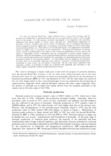Vicissitude of Pesticide Use in Japan
Tropical agriculture research series : proceedings of a symposium on tropical agriculture researches
| ISSN | 03889386 |
|---|---|
| 書誌レコードID(総合目録DB) | AA00870529 |

本文フルテキスト
tars16-_69-76.pdf1.47 MB
Just after the Second World War, Japan suffered from a serious food shortage, and the increase and stabilization of agricultural production were an urgent need in order to secure enough food for the people. For this purpose, pesticides had played a very important role, and their application had spread rapidly to various crops, especially rice. Indiscriminate application of pesticides, however, revealed some adverse effects of pesticides, that is, accidental poisoning of fanners engaged in pesticide application, consumption of pesticide residues in food by the people, environmental pollution, etc. These effects were attributable partly to the application of pesticides which are highly toxic or persistent in the environment. Following the disclosure of adverse effects, various countermeasures were taken by the concerned organizations in every sector with regard to mammalian toxicity, formulation and use of pesticides to prevent human hazards of pesticides, while the development of new pesticides having different chemical structures and modes of action and the improvement of formulations for saving labor for agricultural practices have been promoted actively by the pesticide industry. It is also evident that the changes in the incidence of major pests of economically important crops and the occurrence of pesticide-resistant pests influenced, to ,some extent, the use pattern of pesticides. On the other hand, registration and inspection systems of pesticides in Japan are at present well organized, and contribute to the proper supply of pesticides needed for agricultural pest control.
| 刊行年月日 | |
|---|---|
| 作成者 | Chojiro TOMIZAWA |
| 公開者 | Japan International Research Center for Agricultural Sciences |
| 巻 | 16 |
| 開始ページ | 69 |
| 終了ページ | 76 |
| 言語 | eng |
